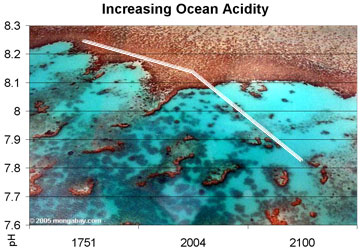Climate change will transform the chemical-makeup of the ocean
Jeremy Hance, mongabay.com
December 11, 2008
By studying the ocean’s past, scientists have discovered that climate change has a much larger affect on ocean chemistry than expected. The study, published in Science, reveals that 13 million years ago climate change significantly altered the chemical composition of the oceans. Such changes in the ocean’s chemical makeup today could have a great impact on marine life, already stressed by overfishing and pollution.
Around 13 million years ago "the climate got colder, ice sheets expanded, sea level dropped, and the intensity, type, and extent of weathering on land changed," explains Elizabeth Griffith, a member of the research team.

Observed and projected decline in global ocean pH, 1750-2100. Photo by Rhett A. Butler |
Adina Paytan, another member of the team, adds that the past climate change "caused changes in ocean circulation and in the amount and composition of what rivers delivered to the ocean. This in turn impacted the biology and chemistry of the ocean."
To discover the changes in ocean chemistry millions of years ago, the scientists analyzed core samples of the mineral barite from deep in the Pacific Ocean Basin. Looking at the calcium isotopes from different layers of the sediment, they discovered that between 13 and 8 million years ago the ocean’s calcium levels changed drastically. At that time Antarctic ice sheet grew exponentially, transforming a huge volume of water into ice caps. The amount of water locked up in these ice caps became so large that sea levels worldwide dropped.
"The ocean's calcium cycle is closely linked to atmospheric carbon dioxide and the processes that control seawater's acidity," co-author of the paper, Ken Caldeira, adds. Already, increasing acidification of the ocean is decimating certain populations of coral. In past research Caldeira has pointed out that an increasingly acidic ocean will doom the world’s fishing industry and degrade 98 percent of the world’s coral reefs in less than fifty years.
Using the past as a model for contemporary climate change, Caldeira predicts that "as CO2 increases and weather patterns shift, the chemical composition of our rivers will change, and this will affect the oceans. This will change the amount of calcium and other elements in ocean salts."
"What we learned from this work is that the ocean system is much more sensitive to climate change than we have previously appreciated," Griffith adds. "We thought that the concentration of calcium, which is a major element in seawater, would change slowly and gradually over tens of millions of years. But what our data suggests is that there could be a more dynamic relationship between climate and ocean chemistry, which can sometimes result in rapid biogeochemical reorganization."
Emphasizing the unexpected nature of the team’s findings, Paytan suggests that this new evidence should not be ignored by policy makers: "We need to keep this in mind when considering future climate and other anthropogenic changes, like ocean acidification, and their impact on the ocean and ocean resources."
CITATION: A dynamic marine calcium cycle during the past 28 million years. Elizabeth M. Griffith, Adina Paytan, Ken Caldeira, Thomas D. Bullen and Ellen Thomas. Science (December 12, 2008).














